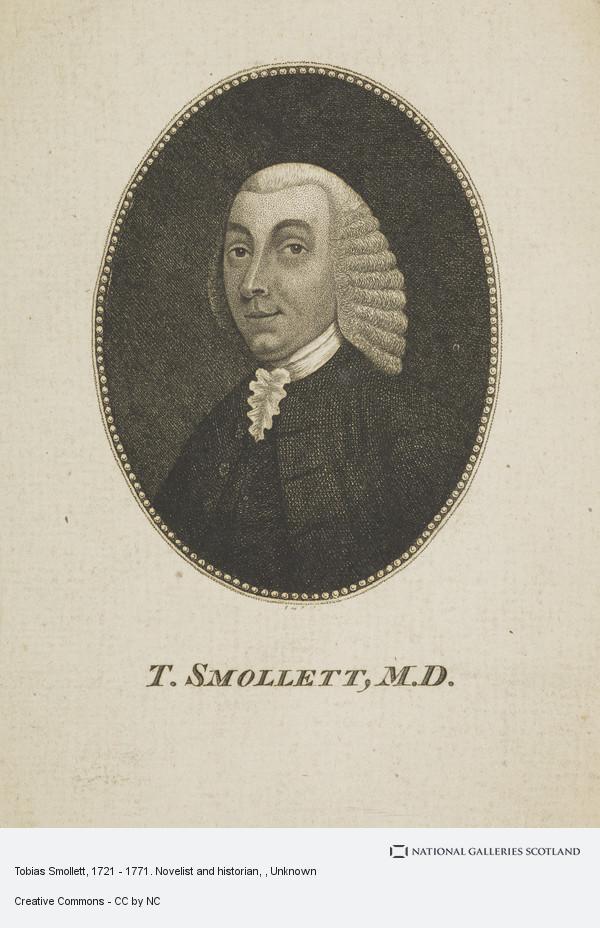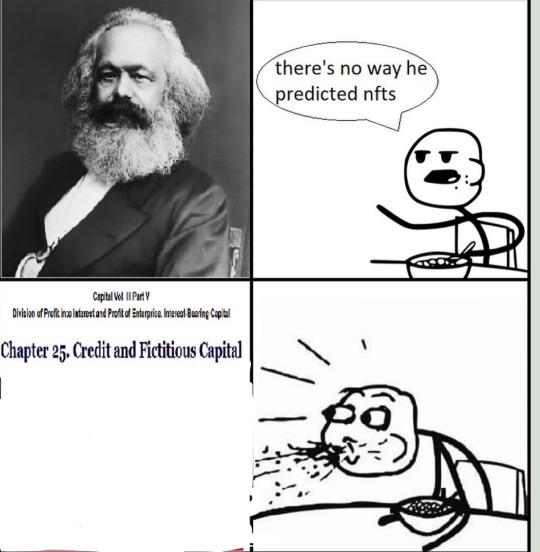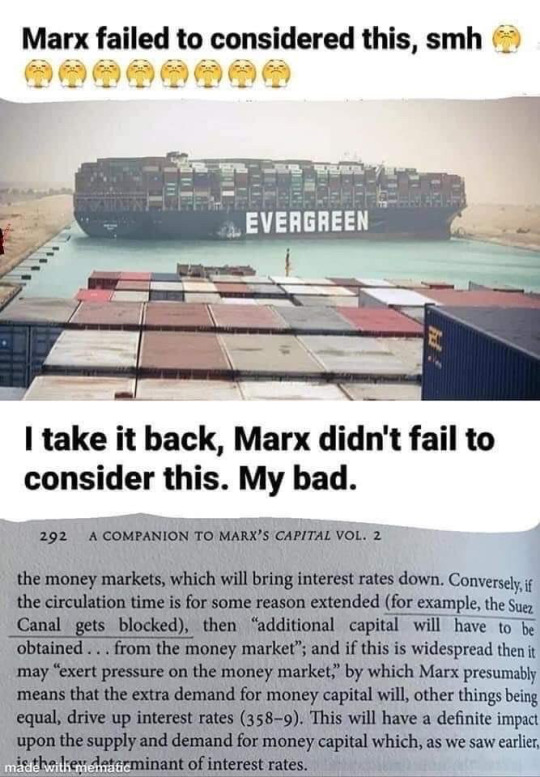#ferdinand lassalle
Explore tagged Tumblr posts
Text
Was der Sozialismus will, ist nicht Eigentum aufheben, sondern im Gegenteil individuelles Eigentum, auf Arbeit gegründetes Eigentum erst einführen.
What socialism wants is not to abolish property, but on the contrary to introduce individual property, property based on labor.
Ferdinand Lassalle (1825 – 1864), German writer, politician and spokesman of the early German workers' movement
31 notes
·
View notes
Text

5 notes
·
View notes
Text
“Party struggles lend a party strength and vitality; the greatest proof of a party’s weakness is its diffuseness and the blurring of clear demarcations; a party becomes stronger by purging itself.”
—Ferdinand Lassalle, in a letter to Karl Marx, June 24, 1852
0 notes
Note
I've been reading Marx for a while, though only his shortest books so far, and there's one thing I'm not sure I understand. If under a socialist economy commodities are priced at their cost of production, and the worker is paid the exact price of their labor power - then where does economic growth come from? The fact the price of labor power is equal to the price of the means of subsistence, whose commodities are in turn priced at the cost of production, has somewhat confused me
marx specifically critiqued ferdinand lassalle's idea that the worker could be paid 'the exact price of their labour power' in his critique of the gotha programme--basically explaining that some of the value would need to be kept in a 'social reserve fund' for exactly this reason! (and also to provide universal social care)
Let us take, first of all, the words "proceeds of labor" in the sense of the product of labor; then the co-operative proceeds of labor are the total social product. From this must now be deducted: First, cover for replacement of the means of production used up. Second, additional portion for expansion of production. Third, reserve or insurance funds to provide against accidents, dislocations caused by natural calamities, etc. These deductions from the "undiminished" proceeds of labor are an economic necessity, and their magnitude is to be determined according to available means and forces, and partly by computation of probabilities, but they are in no way calculable by equity. There remains the other part of the total product, intended to serve as means of consumption. Before this is divided among the individuals, there has to be deducted again, from it: First, the general costs of administration not belonging to production. This part will, from the outset, be very considerably restricted in comparison with present-day society, and it diminishes in proportion as the new society develops. Second, that which is intended for the common satisfaction of needs, such as schools, health services, etc. From the outset, this part grows considerably in comparison with present-day society, and it grows in proportion as the new society develops. Third, funds for those unable to work, etc., in short, for what is included under so-called official poor relief today. Only now do we come to the "distribution" which the program, under Lassallean influence, alone has in view in its narrow fashion -- namely, to that part of the means of consumption which is divided among the individual producers of the co-operative society.
73 notes
·
View notes
Text
"It is obvious that I do not say anything concerning the particular process of development of, for example, a grain of barley from germination to the death of the fruit-bearing plant, if I say it is a negation of the negation" (Engels, Anti-Dühring).
This quote by Engels applies to a lot of self-described Marxists, even Lenin at times. Lenin we can forgive because most of his work on dialectics was in private notebooks where he was in the process of working things out.
Dialectical materialism doesn't really explain anything. It is a language of processes but you still need to understand the process to use the language correctly and say anything meaningful. The error of Lysenko and the Soviets of that era was expecting to apply ready-made conceptions and methods to a science. Marx actually critiques Ferdinand Lassale for trying to do this with economics:
"He will discover to his cost that it is one thing for a critique to take a science to the point at which it admits of a dialectical presentation, and quite another to apply an abstract, ready-made system of logic to vague presentiments of just such a system" (MECW, 40:261).
Dialectical materialism, then, can be understood as a shared language that can emerge within the sciences to describe complex processes. There are actually other attempts to create shared language in this respect. My favorite is Cybernetics and Systems Theory. IMO, in complex systems theory, you start to get a lot of things that mirror dialectics.
At best, though, this shared language would allow easier communication between the sciences on many topics but would not explain processes on its own.
The sciences cannot be fundamentally transformed by the ideas of the scientists alone. They have to be unchained from the profit motive and the need for funding.
The Marxist and engineer Amadeo Bordiga says:
"Whether or not it be behind the capitalist as a person, industrial fixed capital, as opposed in its capitalist form to human labour, becomes the measure of the exchange value of products or commodities. This is the enemy Monster that hangs over the mass of producers, monopolising a product that concerns not only all present human beings but the entire course of the species down through the millennia. This product is the science and technology elaborated and deposited in the social brain. Today, with the degeneration of the capitalist form, this Monster is killing science itself, misgoverning it, criminally exploiting it fruits, squandering the heritage of future generations" (Bordiga, The Science and Passion of Communism).
In other words, it is the removal of the economic and political whips and chains placed on science that will radically change it, allowing it to stretch freely with the needs of humanity.
#dialectics#communism#marxism#socialism#science#dialectical materialism#materialism#leftist#left communism#bordiga#karl marx#marxist#philosophy
4 notes
·
View notes
Text
i don't use instagram very much so my feed is like 33% a specific acquaintances "memes" that are not-so-subtle advertisements for her OF, 33% actual ads, and 33% incomprehensible memes about ferdinand lassalle(?).
in small doses, its doing a decent job of keeping me angry confused and horny
3 notes
·
View notes
Text
Sometimes you gotta mute an account just because of its name, like fuck off Ferdinand Lassalle
4 notes
·
View notes
Text





On September 17th 1771, Tobias Smollett, Scottish novelist and playwright, died.
Smollett was an author and translator of the Scottish Enlightenment who lodged in Edinburgh with his sister at St John’s Pend on the Royal Mile.He was a tremendously popular author of what are broadly termed ‘picaresque’ novels of the late eighteenth century: The Adventures of Roderick Random, The Adventures of Peregrine Pickle , The Adventures of Ferdinand Count Fathom and most famously The Expedition of Humphry Clinker.
He also translated Cervantes’ masterpiece Don Quixote in , championing the book in the English-speaking world through his popularity as a picaresque author.
Smollett was born of a good family in Dunbartonshire, on March 19, 1721, the third child of Archibald and Barbara Smollett. He studied medicine at the University of Glasgow during the 1730s, but he did not receive his formal medical degree from Marischal College, Aberdeen, until 1750. After a brief term as an apprentice surgeon in Glasgow in 1739, Smollett moved to London in order to pursue his literary ambitions. Financial necessity led him to take a post as surgeon's mate aboard H.M.S. Chichester in 1740. His grim exposure to life in the Royal Navy provided him with many of the vivid scenes of life at sea that he later incorporated into Roderick Random and other novels.
Smollett returned to London from the West Indies briefly in 1742, but he soon sailed back to Jamaica, where he married Anne Lassalls, an heiress, probably in 1743. In 1744, at the same time that he was trying to establish a medical practice in London, Smollett began to publish a series of minor poems and attempted unsuccessfully to have his first play, an ill-starred tragedy entitled The Regicide, produced. Of the occasional odes that Smollett published between 1744 and 1747, the best was his movingly patriotic The Tears of Scotland. The most noteworthy of his Juvenalian verse satires, Advice and Reproof, merely furthered his growing reputation as a quarrelsome Scotsman outraged by the refined vices of London.
For our Outlander fans, the books that is, in The Fiery Cross, Lord John Grey sends Jamie a copy of the newly published “The Expedition of Humphry Clinker” by Tobias Smollett. Further in that same book, Fraser’s Ridge library has another of Tobias Smollett’s works “The Adventures of Roderick Random“ and in A Breath of Snow and Ashes, Smollet is also mentioned.
Smollett is one of the 16 Scottish writers and poets depicted on the lower section of the Scott Monument in Princes Street, as in the second pic. He appears on the far left side of the east face. He also has a monument to his honour in beside Renton Primary School, Dunbartonshire.
7 notes
·
View notes
Text
Its a bit more complicated to than @queen-mayhem-blog is presenting it here, because that isn't the only example of Marx being anti semitic
Now it is important to note, Marx was in no way racially anti Semitic, he was ethnically Jewish and at no point does he ever call for violence against Jewish people. but he was a very secular jew and he had a very assimilationist dismissive attitude towards "Jewish culture" Even if we accept that the "the Jewish Question" was a satire, that isn't his only writing on the subject. He refers to a collegue who he borrowed money form as "The little Jew Bamberger", he called an intellectual he disagreed with as "That Jew Spielmann". He complained about being on holiday in Ramsgate in 1879 about "too many Jews and Flees" and referred to Ferdinand Lassalle (who coined the the Iron law of wages) as "a Jewish N***er"
In his article "The Russian Loan" from 1856 he wrote
"Thus we find every tyrant backed by a Jew, as is every pope by a Jesuit. In truth, the cravings of oppressors would be hopeless, and the practicability of war out of the question, if there were not an army of Jesuits to smother thought and a handful of Jews to ransack pockets."
"… Thus do these loans, which are a curse to the people, a ruin to the holders, and a danger to the governments, become a blessing to the houses of the children of Judah. This Jew organization of loan-mongers is as dangerous to the people as the aristocratic organization of landowners… The fortunes amassed by these loan-mongers are immense, but the wrongs and sufferings thus entailed on the people and the encouragement thus afforded to their oppressors still remain to be told."
"… The fact that 1855 years ago Christ drove the Jewish moneychangers out of the temple, and that the moneychangers of our age enlisted on the side of tyranny happen again chiefly to be Jews, is perhaps no more than a historical coincidence. The loan-mongering Jews of Europe do only on a larger and more obnoxious scale what many others do on one smaller and less significant. But it is only because the Jews are so strong that it is timely and expedient to expose and stigmatize their organization."
So with respect to @queen-mayhem-blog I don't think he was being ironic in the Jewish question, I think Marx was just being an antisemit (though to be clear, Bauer was even more anti-Semitic).
Now some context matters, and Marx was much less antisemitic than most leftists at the time (to say nothing of Rightists) and he was again, never imagined Jews as a racial identity. He was also, to be clear, also a victim of antisemitism at numerous points in his life, and neo nazis to this day link his being Jewish to the supposedly "Jewish" nature of communism.
Now how Marx managed to predict NFT is because...capitalism is anything if not predictable in terms of its tendnecy towards cons and exploitation



136K notes
·
View notes
Text
Marxism and the Manipulation of Man by Ludwig von Mises
It is an astonishing fact that a philosophy like Marxism, which attacks the whole social system, remained for many decades more or less unattacked and uncontested. Karl Marx was not very well known in his lifetime and his writings remained practically unknown to the greater part of his contemporaries. The great socialists of his age were other men—for instance, Ferdinand Lassalle. Lassalle’s…

View On WordPress
0 notes
Text
In einem Staate ist der einzelne nicht nur für sich, er ist zugleich für alle da; es ist seine Aufgabe, die gesetzliche Freiheit aller, es ist seine Pflicht, die sittliche Grundlage des Staates gegen Gewalt zu schützen.
In a state, the individual is not only there for himself, he is also there for everyone; it is his task to protect the legal freedom of all, it is his duty to protect the moral foundation of the state against violence.
Ferdinand Lassalle (1825 – 1864), German writer, politician, and spokesman of the early German workers' movement
24 notes
·
View notes
Text
Labor Day

Labor day quotes and history Labor Day, an article that explains the history, the major facts, the meaning, the celebrations and quotes to honor and recognize the American labor movement and the works and contributions of laborers to the development and achievements of the United States. Labor Day in New York and in the USA is a bit like the equivalent of our International Workers' Day to be celebrated on May 1 of each year, a tradition that continues to this day in more than 60 countries. In America it is a national holiday which in the Big Apple brings folkloristic and festive events along the streets of the city . It is officially celebrated on the first Monday of September (Monday 2 September 2024), even if the celebration extends to the entire weekend preceding it, with the organization of various events and manifestations. Our labour preserves us from three great evils - weariness, vice, and want. Voltaire, Candide The ceaseless labour of your life is to build the house of death. Michel de Montaigne He who works with his hands is a laborer. He who works with his hands and his head is a craftsman. He who works with his hands and his head and his heart is an artist. Saint Francis of Assisi I am opposing a social order in which it is possible for one man who does absolutely nothing that is useful to amass a fortune of hundreds of millions of dollars, while millions of men and women who work all the days of their lives secure barely enough for a wretched existence. Eugene Debs You count the waves. (Labour in vain.) Proverb, (Latin) To have one's labour for one's pains. Proverb The poor have to labour in the face of the majestic equality of the law, which forbids the rich as well as the poor to sleep under bridges, to beg in the streets, and to steal bread. Anatole France In vain our labours are, whatsoe'er they be, unless God gives the Benediction. Robert Herrick What needs my Shakespeare for his honoured bones, The labor of an age in pilèd stones, Or that his hallowed relics should be hid, Under a star-y-pointing pyramid? Dear son of memory, great heir of fame, What need'st thou such weak witness of thy name? John Milton The gain in self-confidence of having accomplished a tiresome labour is immense. Arnold Bennett Every job from the heart is, ultimately, of equal value. The nurse injects the syringe; the writer slides the pen; the farmer plows the dirt; the comedian draws the laughter. Monetary income is the perfect deceiver of a man's true worth. Criss Jami Enable every woman who can work to take her place on the labour front, under the principle of equal pay for equal work. Mao Zedong No man needs sympathy because he has to work, because he has a burden to carry. Far and away the best prize that life offers is the chance to work hard at work worth doing. Theodore Roosevelt Even in the meanest sorts of labor, the whole soul of a man is composed into a kind of real harmony the instant he sets himself to work. Thomas Carlyle Even in the meanest sorts of labor, the whole soul of a man is composed into a kind of real harmony the instant he sets himself to work. Thomas Carlyle We've no use for intellectuals in this outfit. What we need is chimpanzees. Let me give you a word of advice: never say a word to us about being intelligent. We will think for you, my friend. Don't forget it. Louis-Ferdinand Celine The fruit derived from labor is the sweetest of all pleasures. Luc De Clapiers A man's best friends are his ten fingers. Robert Collyer Labor is man's greatest function. He is nothing, he can do nothing, he can achieve nothing, he can fulfill nothing, without working. Orville Dewey He that hath a trade hath an estate; He that hath a calling hath an office of profit and honor. Benjamin Franklin Labor is the source of all wealth and all culture. Ferdinand Lassalle Who will not suffer labor in this world, let him not be born. John Florio I tell you, sir, the only safeguard of order and discipline in the modern world is a standardized worker with interchangeable parts. That would solve the entire problem of management. Jean Giraudoux Excellence in any department can be attained only by the labor of a lifetime; it is not to be purchased at a lesser price. Samuel Johnson Labor is the curse of the world, and nobody can meddle with it without becoming proportionately brutalized. Nathaniel Hawthorne If a little labor, little are our gains. Man's fortunes are according to his pains. Robert Herrick Labor is the instituted means for the methodical development of all our powers under the direction and control of the will. Josiah Gilbert Holland Life gives nothing to man without labor. Horace Every man is dishonest who lives upon the labor of others, no matter if he occupies a throne. Robert Green Ingersoll Take not from the mouth of labor the bread it has earned. Thomas Jefferson Labor, if it were not necessary for existence, would be indispensable for the happiness of man. Samuel Johnson Genius begins great works; labor alone finishes them. Joseph Joubert Syzygy, inexorable, pancreatic, phantasmagoria --- anyone who can use those four words in one sentence will never have to do manual labor. W.P. Kinsella Precious gems are profoundly buried in the earth and can only be extracted at the expense of great labor. Sri Anandamayi Ma I believe in the dignity of labor, whether with head or hand; that the world owes no man a living but that it owes every man an opportunity to make a living. John D. Rockefeller The miracle of the seed and the soil is not available by affirmation; it is only available by labor. Jim Rohn It is not, truly speaking, the labor that is divided, but the men divided into mere segments of men, broken into small fragments and crumbs of life, so that all the little piece of intelligence that is left in a man is not enough to make a pin, or a nail, but exhausts itself in making the point of a pin or the head of a nail. John Ruskin There is no real wealth but the labor of man. Percy Bysshe Shelley Labor is still, and ever will be, the inevitable price set upon everything which is valuable. Samuel Smiles If a man loves the labor of his trade apart from any question of success or fame, the Gods have called him. Robert Louis Stevenson The biggest labor problem is tomorrow. Brigham Young

Labor Day, facts and quotes Labour Day (Labor Day in the United States) is an annual holiday to celebrate the achievements of workers. Labour Day has its origins in the labour union movement, specifically the eight-hour day movement, which advocated eight hours for work, eight hours for recreation, and eight hours for rest. For most countries, Labour Day is synonymous with, or linked with, International Workers' Day, which occurs on 1 May. For other countries, Labour Day is celebrated on a different date, often one with special significance for the labour movement in that country. Labour Day is a public holiday in many countries. Labor Day is a federal holiday and falls on the first Monday of September every year. It was initially organized to celebrate labor unions and their contributions to the United States' economy. Labor Day is a public holiday. It is a day off for the general population, so all Government offices, organizations, and schools and most businesses are closed. Many cities, towns, and neighborhoods organize and hold public celebrations such as firework displays, picnics, and barbecues. Labor Day 2020 will occur on Monday, September 7. Labor Day pays tribute to the contributions and achievements of American workers and is traditionally observed on the first Monday in September. It was created by the labor movement in the late 19th century and became a federal holiday in 1894. Labor Day weekend also symbolizes the end of summer for many Americans, and is celebrated with parties, street parades and athletic events. Many residents take advantage of the long Labor Day weekend to take a last summer trip. Because of this, there may be traffic congestion on highways and at airports. Public transit systems do not usually operate on their regular timetables. For students, Labor Day is the last chance to take a break before school starts again for the fall session. The American football season begins on or around Labor Day, and many teams play their first game of the season during the Labor Day weekend. The first Labor Day was held in 1882, and its origins stem from the Central Labor Union's desire to create a holiday for workers. It became a federal holiday in 1894. Originally, it was intended that the day would be filled with a street parade to allow the public to appreciate the trade and labor organizations' work. After the parade, a festival was to be held to amuse local workers and their families. In later years, prominent men and women had speeches. This is less common now but is sometimes seen in election years. One of the reasons for choosing to celebrate this on the first Monday in September, and not on May 1, which is common in the rest of the world, was to add a holiday in the long gap between Independence Day in July and Thanksgiving in November. In the late 1800s, at the height of the Industrial Revolution in the United States, the average American worked 12-hour days and seven-day weeks in order to eke out a basic living. Despite restrictions in some states, children as young as 5 or 6 toiled in mills, factories and mines across the country, earning a fraction of their adult counterparts’ wages.

Labor Day parades and celebrations People of all ages, particularly the very poor and recent immigrants, often faced extremely unsafe working conditions, with insufficient access to fresh air, sanitary facilities and breaks. As manufacturing increasingly supplanted agriculture as the wellspring of American employment, labor unions, which had first appeared in the late 18th century, grew more prominent and vocal. They began organizing strikes and rallies to protest poor conditions and compel employers to renegotiate hours and pay. Many of these events turned violent during this period, including the infamous Haymarket Riot of 1886, in which several Chicago policemen and workers were killed. Others gave rise to longstanding traditions: On September 5, 1882, 10,000 workers took unpaid time off to march from City Hall to Union Square in New York City, holding the first Labor Day parade in U.S. history. The idea of a “workingmen’s holiday,” celebrated on the first Monday in September, caught on in other industrial centers across the country, and many states passed legislation recognizing it. Congress would not legalize the holiday until 12 years later, when a watershed moment in American labor history brought workers’ rights squarely into the public’s view. On May 11, 1894, employees of the Pullman Palace Car Company in Chicago went on strike to protest wage cuts and the firing of union representatives. On June 26, the American Railroad Union, led by Eugene V. Debs, called for a boycott of all Pullman railway cars, crippling railroad traffic nationwide. To break the Pullman strike, the federal government dispatched troops to Chicago, unleashing a wave of riots that resulted in the deaths of more than a dozen workers. Who Created Labor Day? In the wake of this massive unrest and in an attempt to repair ties with American workers, Congress passed an act making Labor Day a legal holiday in the District of Columbia and the territories. On June 28, 1894, President Grover Cleveland signed it into law. More than a century later, the true founder of Labor Day has yet to be identified. Many credit Peter J. McGuire, cofounder of the American Federation of Labor, while others have suggested that Matthew Maguire, a secretary of the Central Labor Union, first proposed the holiday. Labor Day is still celebrated in cities and towns across the United States with parades, picnics, barbecues, fireworks displays and other public gatherings. For many Americans, particularly children and young adults, it represents the end of the summer and the start of the back-to-school season. Labor Day is in good company since the Uniform Monday Holiday Act of 1968 changed several holidays to ensure they would always be observed on Mondays so that federal employees could have more three-day weekends, and so other holidays that always fall on Mondays include: Martin Luther King, Jr. Day, George Washington’s Birthday (or “President’s Day”); Memorial Day; Columbus Day. Here are the major U.S. holidays. In some cases, businesses, government offices, and schools will be closed, and also the International Days list. New Year’s Eve/New Year’s Day MLK Jr. Day President’s Day Valentine’s Day St. Patrick’s Day Easter/Spring Break Mother’s Day Memorial Day Father’s Day 4th of July Labor Day Halloween Thanksgiving Christmas Eve Christmas Day International Days List Read the full article
#celebrations#history#holiday#InternationalWorkers'Day#Jefferson#Laborday#Milton#Monday#Roosevelt#SamuelJohnson#Shelley#Union#USA#wealth
0 notes
Text
Eine Etiquette-Frage

Macht geht vor Recht, Karikatur aus dem Kladderadatsch vom 8. Februar 1863
"Um gegen die Liberalen zu mobilisieren, verfolgte Bismarck zeitweilig unterschiedliche Pläne. Dazu gehörte auch ein Bündnis mit der sozialdemokratischen Bewegung. 1863 traf er sich mehrfach mit Ferdinand Lassalle, ohne dass dies damals jedoch praktische Auswirkungen gehabt hätte.
Trotz heftiger Proteste – öffentliche Kritik kam sogar vom Thronfolger – und der allgemeinen Erwartung eines Scheiterns der Regierung überlebte Bismarck die Krise politisch. Gegen hohe liberale Beamte, unter ihnen nicht zuletzt Abgeordnete, ging er mit repressiven Mitteln bis hin zu Entlassungen vor. Gleichzeitig wurde die Pressefreiheit in Missachtung der Verfassung praktisch abgeschafft. 1865 forderte Bismarck Professor Rudolf Virchow (ein Mitglied des Preußischen Abgeordnetenhauses) zum Duell, das dieser jedoch ablehnte, weil es keine zeitgemäße Form der Auseinandersetzung sei." (Quelle)
"Bürgersinn ist ein Walzer von Johann Strauss Sohn (op. 295). Das Werk wurde am 7. Februar 1865 im Redouten Saal der Wiener Hofburg erstmals aufgeführt.
Der Walzer wurde für den Bürgerball während des Faschings des Jahres 1865 geschrieben und dort auch in Anwesenheit des Kaiserpaares uraufgeführt. Der Walzer selbst gehört nicht zu den ganz großen Meisterwerken des Komponisten. In der Folge verschwand das Werk wieder von den Konzertplänen. Das lag auch an der Vielzahl von Strauss’ Kompositionen in jenen Jahren, die sich gegenseitig von den Konzertplänen verdrängten. Gelegentlich wird es aber noch aufgeführt." (Quelle)
Johann Strauss Sohn, Bürgersinn, Walzer, Op. 295
youtube
0 notes
Text
Socialism is falsely projected by its sponsors, followers and supporters as a benign system aiming to raise the living standard of all citizens through equal access to resources, etc. In particular, it is said to be a working-class movement whose special concern is the welfare of the working classes.
In reality, none of the current main branches of Socialism such as Marxism (a.k.a. Communism), Social Democracy or Fabianism were founded by working-class people.
The founder of Marxism, Karl Marx, was born into a wealthy middle-class family, was employed as a journalist by liberal financial interests, lived off his inheritance and off the fast-dwindling fortune of his aristocratic wife and was financially supported for the rest of his life by his friend and collaborator Friedrich Engels, a wealthy textile magnate.
The founder of German Social Democracy, Ferdinand Lassalle, was similarly from a middle-class background and a lawyer by profession.
The founders of British Fabianism, too, were middle-class and had very little contact, if any, with working-class people.
- Socialism Exposed by Cassivellaunus (25 December 2012)
Source
#socialism#communism#karl marx#working class#friedrich engels#ferdinand lassalle#democratic socialism#social democracy#marxism#fabianism#fabian society#fabian socialism#politics#economics#literature
2 notes
·
View notes
Photo

Boris Ignatovich. Monument to Ferdinand Lassalle. Leningrad. 1930
[::SemAp Twitter || SemAp::]
#BW#Black and White#Preto e Branco#Noir et Blanc#黒と白#Schwarzweiß#retro#vintage#Boris Ignatovich#Ferdinand Lassalle#Leningrad#Russia#Russie#Russland#USSR#URSS#monument#1930#1930s#30s
109 notes
·
View notes
Text
Whenever I see people say they're "applying a marxist framework" to something, I think about this letter Marx wrote to Engels about Ferdinand Lassale trying to write a book where he applied a "materialist dialectic framework" to economics:
"He will discover to his cost that it is one thing for a critique to take a science to the point at which it admits of a dialectical presentation, and quite another to apply an abstract, ready-made system of logic to vague presentiments of just such a system" (MECW, 40:261).
Instead of taking the historical process of settler-colonialism and analyzing the way it begins just before capitalism and how the logic of capitalism flows out of it, transforms it, and is transformed by it, a lot of these analyses take a static idea of capitalist relations and a static idea of settler-colonial relations and superimpose them on top of each other and then try to explain why one or the other is "primary" or "secondary". The laziness of this social "theory" is as flagrant as the pre-determined outcome based on whatever the author's political allegiances are.
What’s at stake in the debate over settler-colonialism in the United States?
To put it as plainly as possible, if the proponents of the U.S. settler-colonialism theory are correct, then there is no basis whatsoever upon which to build a multinational working class communist party in this country. Indeed, such a view sees the “settler working class” as instruments of colonialism, hostile to the interests of the colonized people, rather than viewing all working and oppressed people as natural allies in the struggle against imperialism, our mutual oppressor.
Obviously, this is a very important strategic point, and it cannot go unaddressed. We should examine where this theory comes from and look at how it can be answered by Marxist-Leninist science.
sooo close to seeing it @ubernegro @redstarovermoundcity @fairuzfan @mettaworldpiece
205 notes
·
View notes